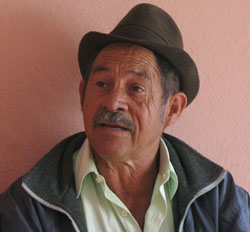
Contact: Refugees International, 202-828-0110, ri@refintl.org
WASHINGTON, April 26 /Standard Newswire/ -- In Colombia, tens of thousands of families continue to flee their homes in search of safety. The numbers remain staggering: over 200,000 people a year flee their homes, making
On a visit to
An Afro Colombian family from the Sipì river basin in Chocó told RI, "We do not want to be part of the conflict. We do not take sides, neither for the guerrilla nor the paramilitary groups. Those violent people are fighting for the control over the coca business; if we refuse to get involved then we need to leave our houses. Last January they gave us eight hours to disappear, so they can loot our belongings, kill the animals and take control of our land."
Those who spoke to us had fear in their eyes, their voices so soft that they could be barely heard --- such clear signs of the trauma they were experiencing.
The Colombian government has probably the world’s best domestic legislation on internal displacement and the most advanced administrative system to respond properly to the needs of displaced civilians. Health facilities must care for sick displaced people and schools must incorporate students from displaced families. But when reaching safer urban places, the displaced find that hardship and misery are too often the norm.
A displaced man from San Roque, north of Pasto in Nariño, who fled because of fighting between guerrilla and paramilitary groups, told RI, “My mother is 89 years old, she was sick and we took her to the hospital. She waited for hours and was never attended. “
Another group of displaced families in Quibdó, Chocó angrily reported to RI, “Yes, money was sent by the government to the school to subsidize our children school fees, but the school principal is demanding additional fees and money for school material. We cannot afford that, and we won’t be able to send our children to school anymore!” Almost all the displaced people interviewed, identified two major needs that still remain largely unmet: dignified housing and access to income generating activities and micro-credit schemes.
The voices of the displaced people are unheard in the sophisticated major Colombian cities. Once reaching urban settlements displaced households, in particular those part of the indigenous and Afro Colombian communities, feel stigmatized and discriminated against. Some urban dwellers accuse the peasants of being supporters of the guerrilla.
Wary of these lingering feelings amongst Colombians, humanitarian and church groups have declared 2007 the Year of the Rights of Internally Displaced Persons. Public events and campaigns are taking place to inform and sensitize Colombian society about the life experiences of those forced to leave everything behind and flee to seek protection. Progressive laws and humanitarian response mechanisms alone can’t fill the emotional and psychological needs of those who have survived violence. Popular acceptance and comprehension can do so and assure a great deal of support and help.




 Sign Up to Receive Press Releases:
Sign Up to Receive Press Releases: